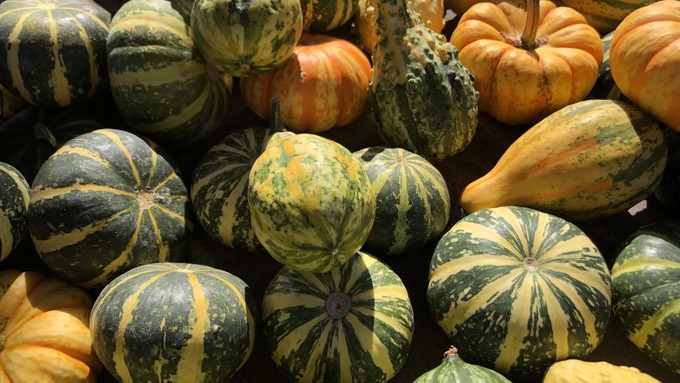
Fall is finally in the air (and so is fire danger)

It's decorative gourd season! Harvest your squash, gourds and pumpkins for decor galore. Kathy Morrison
After a string of summerlike days, gusty conditions are expected to blow through Northern California and drop temperatures by double digits. With those winds comes increased fire danger.
“A significant pattern change will take place in the West this weekend with a major storm system digging and carving through the region,” says the National Weather Service. “A number of weather hazards are expected from high winds for a large chunk of the West to the first heavy mountain snowfall of the season for the northern and central Rockies. Also, temperatures are likely to be well below normal this weekend and all of next week.”
That system definitely will affect Sacramento’s weather week. We start out windy and turn chilly.
Noon to 10 p.m. Sunday, a high wind warning will be in effect for much of the Sacramento Valley and surrounding areas with winds of 15 to 25 mph forecast, says the Sacramento NWS bulletin. Locally, gusts of 30 to 40 mph could hit Sunday afternoon and evening.
Coupled with low humidity, those gusty winds increase fire danger – all it takes is one spark. Put away power tools for another day, especially if working around tall dry grass.
Also be on the lookout for falling limbs (or whole trees). Months of drought have weakened root systems as well as branches. A strong gust may be just enough push to bring a stressed tree down.
Once the winds recede, Sacramento will see some great gardening weather, albeit no rain. Right now, the weather service expects us to stay dry. There’s a “slight chance” of showers late Tuesday night, but otherwise no precipitation is in the forecast.
Through Friday, daytime highs will be pleasantly in the low 70s – below normal for mid October (which averages highs of 78), but 20 degrees cooler than last week. Overnight lows will start dipping into the mid 40s; that will bring out fall colors in trees and finish off the tomatoes.
* Plant trees, shrubs and perennials. Remember to deep-water any transplants.
* Plant seeds for many flowers directly into the garden, including cornflower, nasturtium, nigella, poppy, portulaca, sweet pea and stock.
* Plant seeds for radishes, bok choy, mustard, spinach and peas.
* Plant garlic and onions.
* Set out cool-weather bedding plants, including calendula, pansy, snapdragon, primrose and viola.
* Reseed and feed the lawn. Work on bare spots.
* Dig up corms and tubers of gladioluses, dahlias and tuberous begonias after the foliage dies. Clean and store in a cool, dry place.
* Treat azaleas, gardenias and camellias with chelated iron if leaves are yellowing between the veins.
* Clean up the remains of the summer vegetable garden and compost disease-free foliage.
* Harvest pumpkins and winter squash.
Previous posts on fall planting:
California's favorite winter vegetable to grow: Broccoli
Fallen leaves: Turn mess into mulch
Comments
0 comments have been posted.Sacramento Digs Gardening to your inbox.
Sites We Like
Garden Checklist for week of July 21
Your garden needs you!
* Keep your vegetable garden watered, mulched and weeded. Water before 8 a.m. to reduce the chance of fungal infection and to conserve moisture.
* Feed vegetable plants bone meal, rock phosphate or other fertilizers high in phosphate to stimulate more blooms and fruiting. (But wait until daily high temperatures drop out of the 100s.)
* Don’t let tomatoes wilt or dry out completely. Give tomatoes a deep watering two to three times a week.
* Harvest vegetables promptly to encourage plants to produce more. Squash especially tends to grow rapidly in hot weather. Keep an eye on zucchini.
* Pinch back chrysanthemums for bushy plants and more flowers in September.
* Remove spent flowers from roses, daylilies and other bloomers as they finish flowering.
* Pinch off blooms from basil so the plant will grow more leaves.
* Cut back lavender after flowering to promote a second bloom.
* It's not too late to add a splash of color. Plant petunias, snapdragons, zinnias and marigolds.
* From seed, plant corn, pumpkins, radishes, winter squash and sunflowers.